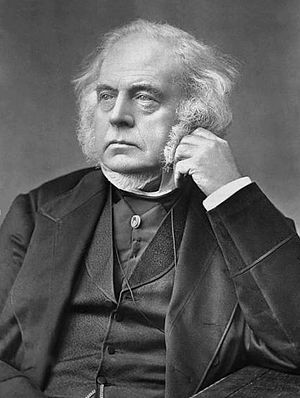“The angel of death has been abroad throughout the land; you may almost hear the beating of his wings.”
Members of this House may think of me, no man regrets it more than
I do--a bitter and angry feeling against that class which has for a long
period conducted the public affairs of this country. I like political
changes when such changes are made as the result, not of passion, but of
deliberation and reason. Changes so made are safe, but changes made
under the influence of violent exaggeration, or of the violent passions
of public meetings, are not changes usually approved by this House or
advantageous to the country. I cannot but notice, in speaking to
Gentlemen who sit on either side of this House, or in speaking to any
one I meet between this House and any of those localities we frequent
when this House is up--I cannot, I say, but notice that an uneasy
feeling exists as to the news which may arrive by the very next mail
from the East. I do not suppose that your troops are to be beaten in
actual conflict with the foe, or that they will be driven into the sea;
but I am certain that many homes in England in which there now exists a
fond hope that the distant one may return--many such homes may be
rendered desolate when the next mail shall arrive. The Angel of Death
has been abroad throughout the land; you may almost hear the beating of
his wings. There is no one, as when the first-born were slain of old, to
sprinkle with blood the lintel and the two sideposts of our doors, that
he may spare and pass on; he takes his victims from the castle of the
noble, the mansion of the wealthy, and the cottage of the poor and the
lowly, and it is on behalf of all these classes that I make this solemn
appeal.
I tell the noble Lord, that if he be ready honestly and frankly to
endeavour, by the negotiations about to be opened at Vienna, to put an
end to this war, no word of mine, no vote of mine, will be given to
shake his power for one single moment, or to change his position in this
House. I am sure that the noble Lord is not inaccessible to appeals made
to him from honest motives and with no unfriendly feeling. The noble
Lord has been for more than forty years a Member of this House. Before I
was born, he sat upon the Treasury bench, and he has spent his life in
the service of his country. He is no longer young, and his life has
extended almost to the term allotted to man.
“If this phrase of the balance of power is to be always an argument for war, the pretext for war will never be wanting, and peace can never be secure.”
But happily the Government of that
day had the good sense not to resist, and the result had not been
disadvantageous to Europe; this country had not suffered from the
seizure of Algiers, and England and France had continued at peace.
Take another case--the case of the United States. The United States
waged war with Mexico--a war with a weaker State--in my opinion, an
unjust and unnecessary war. If I had been a citizen of the American
Republic, I should have condemned that war; but might it not have been
as justly argued that, if we allowed the aggressive attacks of the
United States upon Mexico, her insatiable appetite would soon be turned
towards the north--towards the dependencies of this Empire--and that the
magnificent colonies of the Canadas would soon fall a prey to the
assaults of their rapacious neighbour? But such arguments were not used,
and it was not thought necessary to involve this country in a war for
the support of Mexico, although the Power that was attacking that
country lay adjacent to our own dominions.
If this phrase of the 'balance of power' is to be always an argument for
war, the pretence for war will never be wanting, and peace can never be
secure. Let any one compare the power of this country with that of
Austria now, and forty years ago. Will any one say that England,
compared with Austria, is now three times as powerful as she was thirty
or forty years ago? Austria has a divided people, bankrupt finances, and
her credit is so low that she cannot borrow a shilling out of her own
territories; England has a united people, national wealth rapidly
increasing, and a mechanical and productive power to which that of
Austria is as nothing. Might not Austria complain that we have disturbed
the 'balance of power' because we are growing so much stronger from
better government, from the greater union of our people, from the wealth
that is created by the hard labour and skill of our population, and from
the wonderful development of the mechanical resources of the kingdom,
which is seen on every side? If this phrase of the 'balance of power'
the meaning of which nobody can exactly make out, is to be brought in on
every occasion to stimulate this country to war, there is an end to all
hope of permanent peace.
